What are religious vows?
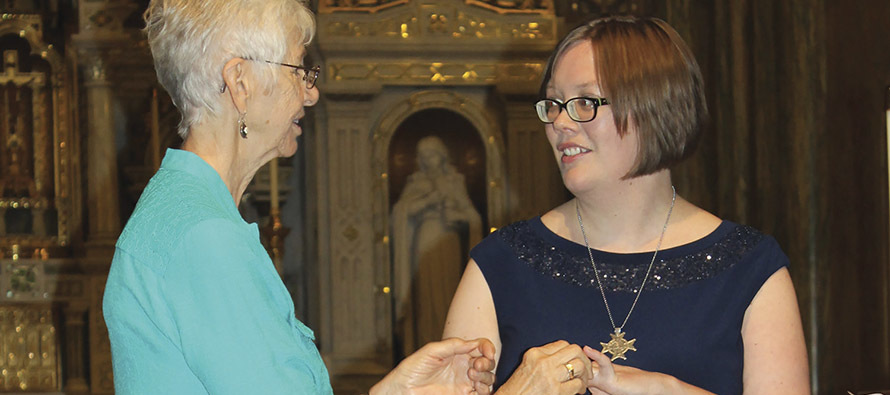
Sister Cecilia Corcoran, F.S.P.A. presents Sister Julia Walsh, F.S.P.A. with a ring during her final vows ceremony. (Photo courtesy of Franciscan Sisters of Perpetual Adoration)
I was just out of high school when I visited a convent for the first time. I buzzed with excitement, aware I might be entering into a world that could define me. I had felt the pull toward a life dedicated wholly to God and wondered what shape that would take. At the convent, I heard women three times my age describe lives centered on God and community, and I observed their joy, dedication, and strength.
I also was introduced to the religious vows. Women and men religious (sisters, nuns, brothers, monks, and some priests) have elected to let these vows be the core of their lifestyle, the pathway to holiness that they pursue.
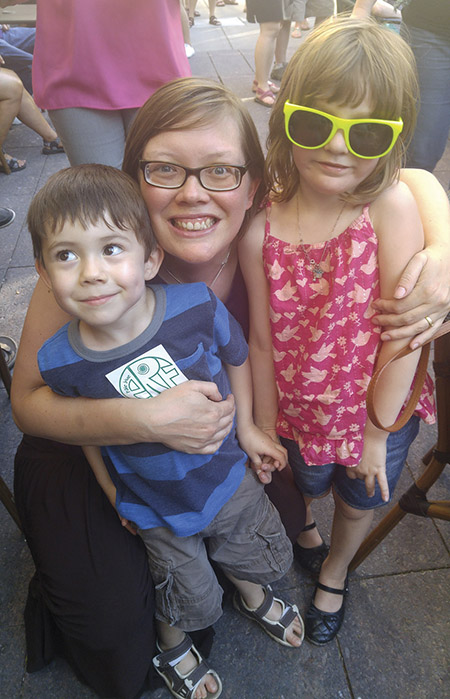
For most, the religious vows are public vows of chastity, poverty, and obedience. These vows are what make them into consecrated women and men—people set aside for special purposes for God. Whether they are living in a monastery or among the poor, these vows direct how each religious lives the gospel and serves God.
The vows define religious and make up the heart of a unique lifestyle. This lifestyle is meant to be prophetic: The vows announce the reign of God, the manifestation of Christ’s peace and justice. The biblical prophets were centered on announcing God’s ways to the world; the vows act in the same way. Compared to biblical prophets, though, religious do not necessarily need to announce God’s ways with words. Rather, they proclaim by the very way they live their lives.
A decade after that first visit to the convent, I stood in front of an altar with Franciscan sisters beside me. I professed vows for the first time and joined a lineage of holy men and women linked back to the early church. My community, family, and friends were with me, witnessing. I gave myself to God in this public manner because my commitment is for others. The words of dedication became my life map.
Poverty
When I vowed poverty I committed to living simply and having no private possessions. This meant that I would share all things in common with my community for the sake of the common good. Poverty is material and spiritual; I remember daily that all things in my life are gifts from which I am called to be detached. This vow includes ordinary items such as pens, books, and clothing and also insists that even my talents are to be shared for God’s purposes.
My vow of poverty is a radical choice to keep God and community first in my life. Although I am able to shop, I do not spend my own money. An approved and monitored budget influences me and prevents me from splurging on things I once enjoyed: no more extra kitchen tools or nail polish. My choices are limited by the structures of sharing, helping me to be mindful of my sisters with greater needs, as well as the homeless mothers we serve.
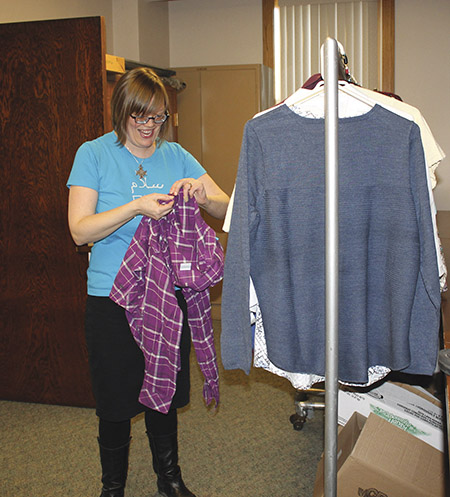
Technically nothing I buy or use is my own; I must use all things in a way that leaves me unattached and free to pass them onward when needed. Even if my community has made a certain car, for example, my responsibility, I know it could be reassigned for another purpose at any time. This reality reminds me that I am made to be interdependent; God and community provide for my needs and I am called to contribute to our mission.
Honestly, I experience a lot of freedom from sharing property. Even so, it can be challenging to “make do with what I have” while my friends update their wardrobes and gadgets. Without the latest fashions, I sometimes feel like a misfit among my non-religious friends; my blouses come from our convent’s “clothing exchange.” The simple living I choose as a sister, however, reminds me to stand in solidarity with those whose poverty causes pain and deprivation.
Another aspect of the vow of poverty is that consuming less means being in a positive relationship with Earth and being a good caretaker of God’s creation; we pollute less, decrease our carbon footprints, and live as sustainably as our means allow. We honor our oneness with creation, God’s designs, through these choices (Col. 1:16).
Chastity
When I vowed chastity I voluntarily dedicated my body to God and opened my heart to love more widely for the sake of God’s reign. Like the vow of poverty, this vow has me living in a particular way—as an unmarried woman—so I can love and serve beyond attachments and possessions. No one can refer to me and say, she’s mine. I am all God’s.
In many ways, it makes absolutely no sense that I would renounce something as good as marriage and motherhood. But, actually that’s the point. The vow of celibacy is prophetic because it doesn’t make sense for this world. Just as the prophets of the Bible did strange things to make a point—like eating scrolls (Ezek. 3:1-11) and burying underwear (Jer. 13:1-11), so too is a vow of chastity bizarre. Some people are particularly called to this vow in order to make a point, or to point to God. It’s “heaven on earth” stuff to say no to marriage, sex, and children and only a few of us are really called to it. That’s what Jesus was talking about when he said that some have “renounced marriage for the sake of the kingdom of heaven” (Matt. 19:21).
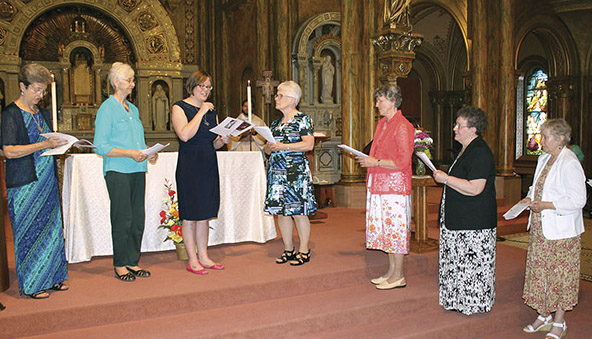
Through my consecrated chastity, I also direct my sexuality—the holy life-giving potential that God gave us all—toward something beyond the nearest horizon. Through this vow my body is consecrated to God; I live to point out another vision for the world wherein every human life is honored as sacred.
Through my consecrated chastity, I also renounce our culture’s obsession with unhealthy sexuality. Through this vow, I cannot become complacent to the disorder of sexuality that the common culture promotes. Namely, I reject any notion that love is strictly about possession, genital expression, or power; I oppose sexual abuse, pornography, sex trafficking, and other violations of human dignity. With my body vowed to God, I live to point out another vision for the world wherein every human life is honored as sacred.
I will be the first to admit that giving up marriage, sex, and children is definitely easier said than done. Just a few interactions with an adorable man can cause me to develop a crush and force me to carefully establish boundaries. Plus, I am at the point in life wherein I crave daily interactions with children; I want to care for them, to help foster their growth. I have found ways to feed this need by being involved in the lives of young people whom I love, particularly my niece and nephew. It’s true that my body churns with a longing to know the natural and sacred experience of union with another. But I said no to that potential, and this made me available to say yes to sharing a wider and broader love: the love of God and God’s people anywhere.
Obedience
When I vowed obedience, I pledged to live a life defined by God’s will and defined by the needs of my religious community. I said yes to growing in humility, so I could submit my selfishness for the sake of the common good.
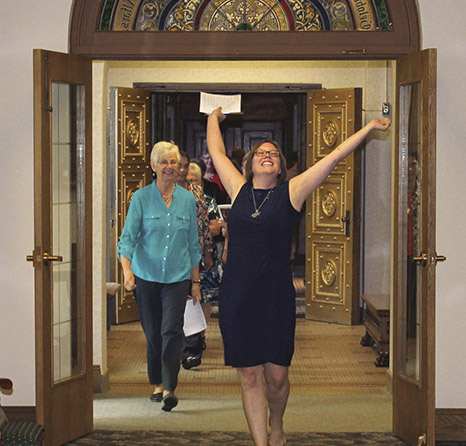
Taking the vow of obedience terrified me the most. I am a very free-spirited person and I was afraid that my personality would be squashed or I would have to give up my dreams and desires. It turned out, though, that my vow of obedience has provided the perfect container wherein my free spirit can thrive, so that rays of God’s light can illumine my God-given spunk. The sisters were eager to receive my talents and gifts and have encouraged me to grow in ways beyond my imagination. Plus, community provides accountability, structure, and in many ways, an ability to be free from the things that can become distractions from serving God and God’s people. I’ve learned that when it comes to the future it is wisest not to trust in myself alone, but rather to trust in the big picture that only God can see—and God speaks through community.
I am a woman made up of hopes and dreams. I want to see the world, I want to experience adventure, I want, I want, I want. Confronted by my selfishness and stubbornness, the vows help me to abandon living for only me, me, me. Once, I was asked to give up a ministry I enjoyed so I could deepen my community relationships. I resisted and struggled, but I obeyed—because that was my vow. This seeming surrender ended up opening pathways to greater health and happiness. Saying yes to God’s will means becoming a better disciple of Jesus. The vow of obedience has set me free.
Zealous living
A vowed religious is zealous for the reign of God. We believe our commitment to this countercultural lifestyle heralds the coming of Christ’s reign. It takes a lot of dedication to constantly witness; it’s daily work. I’ve heard many religious say that they must choose to live the vows each day. We can’t be halfhearted in our discipleship or stagnant in our faith development.
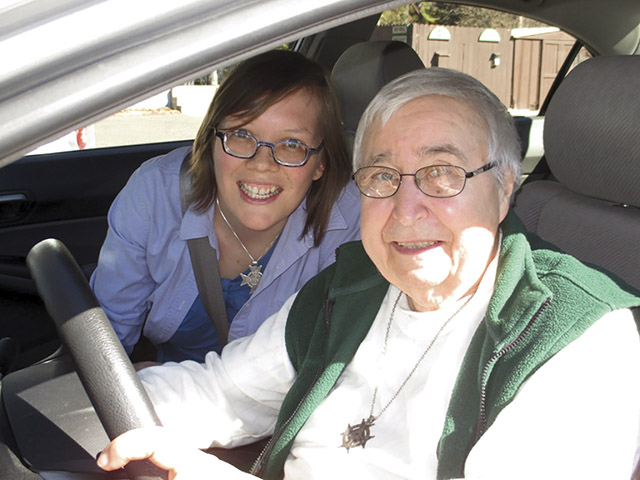
There is a lot of variety among religious communities about how the vows are lived and even which vows are taken. Some monastic communities take a vow of “stability,” meaning that the monastery will remain their home. In some communities, the sisters and brothers may take a fourth vow such as “hospitality” or “service to the poor.” Dominicans only vow obedience, implying with that vow their acceptance of chastity and poverty. Each congregation has a distinct structure, constitution, way of dress, and way of being in the world.
By our commitment and our unique lifestyle, we give our whole selves to God: body, wealth, and will. This bold way of living means holding up signs of hope, bravely, to a discouraged and hurting world. These are not just placards declaring GOD LOVES or protesting sin. Rather, through our lifestyle, with zeal and gusto, we make visible what Christ established: Everything belongs to God, all bodies are sacred, God’s will be done—a whole new world on its way.
Related article: VocationNetwork.org, “A new sister looks at the vows.”
Tags
Related
- Questions you’ll be glad you asked
- What monastic mystics got right about life
- Religious communities embrace diverse members
- How my parents responded when I became a brother
- Vocation Basics: You are already called—Message to youth from Pope Francis
- Meet the parents
- Charism: The gift that shapes lives
- What our vows mean
- Discover five treasures of religious life
- Religious making a difference Read More
Most Viewed
- Find your spirituality type quiz
- Questions and answers about religious vocations
- Celibacy quiz: Could I be a nun? Could I be a brother? Could I be a priest?
- Resources for older discerners or those with physical and developmental differences
- About Vocation Network and VISION Guide


